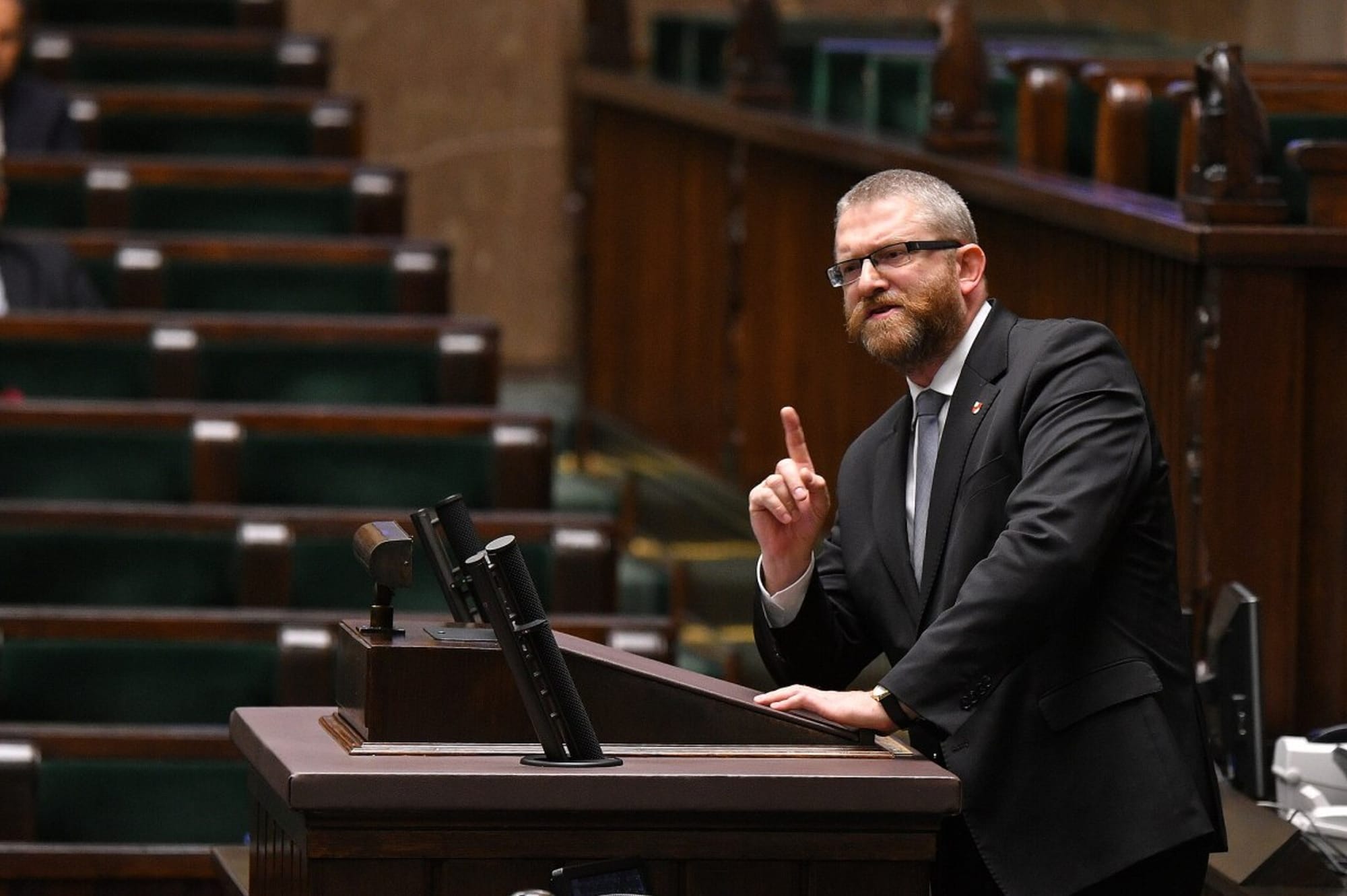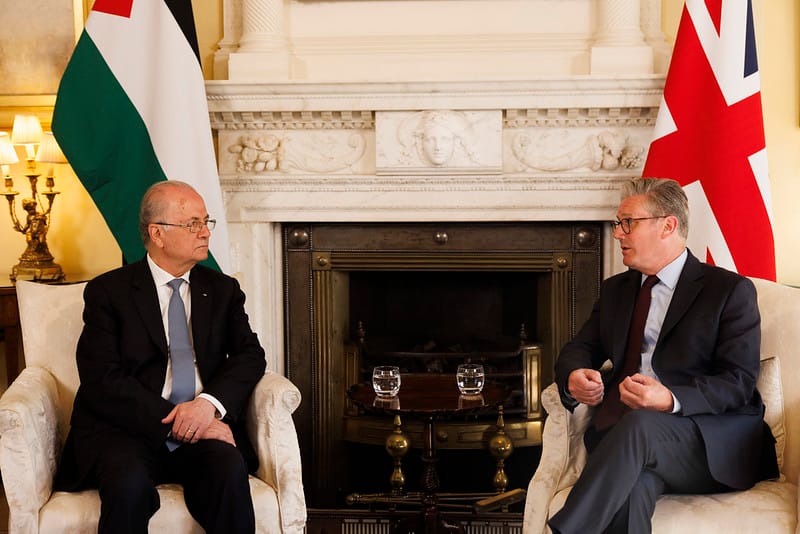What an extinguished Hanukkiah tells us about antisemitism in Poland
Examining the social and political context of Polish MP Grzegorz Braun’s December attack.

Eight years ago, the right-wing Polish publishing house 3Dom published a 10-minute video on its YouTube channel addressing the question, “Was Yoda from Star Wars a Jew?” The man answering the question is Grzegorz Braun, a film director who was then a candidate in the Polish presidential election (in which he would ultimately receive 0.83% of the votes).
In the video, Braun smiles and responds that he understood the question in the context of the true essence of Star Wars: “Who is who behind this anti-monarchical, democratic propaganda facade, which is Lucas’s narrative.” Braun explains that the cause of the war in the films is fiscalism, and labels the Jedi High Council a “small circle headed by a small gentleman making real decisions” whom he refers to as an “intergalactic KGB”. After this brief lecture, the video’s host asks again: “Was Yoda a Jew?” Braun responds, “You said that, I need to think about it.”
Four years later, in 2019, Braun was elected to the Polish parliament on the list of Konfederacja (Confederation), a coalition of far-right, libertarian, nationalist, and fascist groups. Last year, he was re-elected. And on 12 December, he attacked the Hanukkah candle-lighting ceremony in the Polish parliament with a fire extinguisher.
What does the video have in common with this act of hatred, violence and stupidity? Evidently, Braun’s Hanukkah attack wasn’t an isolated incident but a consequence of years of social indifference to casual antisemitism in Poland.
Becoming the norm
On one level, it is an illustration of the many manifestations of fascism, nationalism, racism and antisemitism in Polish public life. It’s important to note that antisemitism comes as part of a package of tropes and rightwing positions (along with Islamophobia and anti-migrant sentiment, among others) often employed by Poland’s right and far-right parties to stoke fears about Polish national sovereignty. Both the rightwing Prawo i Sprawiedliwość (Law and Justice) – which governed Poland from 2015 to 2023 and still maintains significant popularity despite losing power to a center-left coalition – and Braun’s far-right Confederation engage in such practices.
In 2015, for example, during a debate preceding the presidential election, one of the questions that Law and Justice’s Andrzej Duda’s posed to then-President Bronisław Komorowski (from the liberal Platforma Obywatelska – Civil Platform) was about the Jedwabne pogrom – the massacre of Polish Jews by their Polish neighbours in 1941. Duda suggested that further exhumations and investigations are needed to determine who was responsible for the crime – hinting implicitly that Germany was to blame. He won the election.
Further examples abound. During the annual Independence March, which takes place every 11 November in Poland, ordinary people march through the streets of Warsaw alongside Polish (and non-Polish) fascists under nationalist slogans; many rightwing magazines, social media channels and politicians spread fear of the alleged threat of “property recovery” by Jews with the help of the United States (in 2021, the Polish nationalist organisation Młodzież Wszechpolska dumped a pile of rubble in front of the Israeli embassy in Warsaw with a banner reading: “Here is your property”); anti-refugee propaganda was one of the most important tools that Law and Justice utilised to win elections; in 2018, Polish authorities decided to enact a law significantly restricting the freedom of Holocaust research; and since 2019, Confederation has been represented in the Polish parliament (though it has never been part of a ruling coalition).
The way in which the antisemitic narrative intersects with other exclusionary narratives, such as anti-refugee sentiments, is best exemplified by the recent remarks of two rightwing commentators. Jan Pietrzak, on the Telewizja Republika channel, made, in his own words, a “cruel joke” suggesting that immigrants could be placed in barracks at Auschwitz and other concentration camps. A few days later, Marek Król, on the same television channel, remarked: “The simplest way is to put chips on them, like we do with dogs. And, of course, a cheaper option is to tattoo numbers on their left arms.”
Antisemitic threads, interwoven with Islamophobia and racism, are nothing new in Polish politics. In recent years, however, they have been gaining strength. At the same time, there has been insufficient opposition to these trends from politicians and civil society. Why? Because this messaging – especially anti-refugee propaganda – turned out to be a very effective way to manage social emotions, not only in Poland but also across Europe.
In the case of both Law and Justice and Confederation, anti-refugee propaganda was accompanied by anti-German, anti-EU, and antisemitic messages (Confederation also threw in some anti-Ukrainian and anti-vax language, in effect implementing – consciously or not – Russia’s agenda). While it is relatively easy to oppose the anti-EU narrative in Poland because Poles are still very enthusiastic about European cooperation, in other cases, a significant part of the parties to the left of Law and Justice decided to avoid “controversial” issues, because they were afraid it would reduce their support.
In Braun’s case, it’s important to say that many people, including myself, realized too late how dangerous Braun is. I remember well that I watched the aforementioned video when it appeared on YouTube. I, like many others, was laughing, joking and unfortunately downplaying the phenomenon of his rising popularity, and that of other public figures like him. For too long, he was treated as an actual – though perhaps unconscious – performer, a “funny” guy with “strange” views who greets you on TV with the old Polish “God bless you” and talks absurdities about Star Wars.
At the same time, Braun and his comrades in Confederation worked hard to convince more and more people to vote for them. They appealed to the public’s aversion to taxes ( remember how the cause of the war in Star Wars is fiscalism?) and conservative Catholic values, as well as xenophobic and antisemitic sentiments. As Confederation leader Sławomir Mentzen put it in 2019, they are against five things: “Jews, homosexuals, abortion, taxes, and the EU.”
Reasons for optimism
Antisemitic messages are still finding fertile ground in Poland, as a new report by the Museum of the History of Polish Jews (POLIN) – “Who Do Poles See When They See a Jew” – has found (the report’s publication was accelerated because of Braun’s attack). The authors of the report, published in Polish, analysed press articles and internet statements from 2019-22 and books, movies, TV series, advertisements and gadgets from 1950-2022, and found that more than half of Poles state that they encounter stereotypes about Jews.
“Despite the currently small Jewish community in Poland, antisemitism is unfortunately still present,” the authors write. “Many people using antisemitic stereotypes or rhetoric use them to insult and discriminate not necessarily and not only Jews, but often all those who, for some reason, are perceived as strangers or different.”
The authors also diagnose that in the Polish collective imagination, there exists “unconscious antisemitism”. The most important narratives that make up this type of antisemitism are: Jews are ungrateful (strongly connected with the narrative about Poles rescuing Jews during the second world war and perceiving Jews as strangers; conspiracy theories about Jewish power; and the notion that Jews take care of their own interests, so we should learn from them.
Luckily, the higher the voter turnout in elections in Poland, the lower the support for parties with such slogans and beliefs. In the parliamentary election in 2023, voter turnout was record-breaking. Thanks to this, Confederation, which had 15% support in the polls in July, ultimately received just over 7% of the votes. And although it has seven more MPs than in the previous term, it is the smallest force in parliament.
After Braun’s attack, his colleagues condemned his act but didn’t expel him from the party – first, because every MP is important for Confederation (and Braun definitely isn’t alone with his worldview in the party), and second, because a significant group of Confederation’s supporters wouldn’t understand such a decision. After all, Braun received a lot of support online after his attack.
What offers some hope is the reaction of other parties. All of them, including Law and Justice – which, it should be noted, simultaneously tried to use the situation to attack the chairman of parliament – condemned Braun’s attack. A few days later, Hanukkah candles in the Polish Parliament were relit in the presence of the president, speakers of both houses of parliament, and government ministers.
Poland’s chief rabbi, Michael Schudrich, said: “This is not the only time in history when someone tried to extinguish our light, but Polish and Jewish history will always light the candles again; they cannot extinguish us because we stand together.” Braun, despite still being an MP, was banned from entering the building that day. And this week, MPs voted to revoked Braun’s parliamentary immunity – a move that was opposed only by Confederation.
In the video about Yoda and Star Wars, Braun, who was not yet an MP, said: “This is a reality of democracy, that the biggest idiots become members of parliament, people who guarantee their principles that they will understand nothing at all.” If I were being mean, I would say Braun was talking about himself. But it’s not true. Now more than ever, we know that Braun isn’t an idiot, which only makes him more dangerous. For that reason, I don’t want to laugh carelessly anymore while watching his videos. It’s not funny at all. ▼
Ignacy Dudkiewicz is a philosopher, bioethicist, social activist and publicist. He is editor-in-chief of Kontakt Magazine, the only magazine of the Catholic left in Poland.
Author
Ignacy Dudkiewicz is a philosopher, bioethicist, social activist and publicist. He is editor-in-chief of Kontakt Magazine, the only magazine of the Catholic left in Poland.
Sign up for The Pickle and New, From Vashti.
Stay up to date with Vashti.



